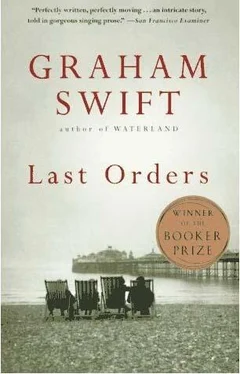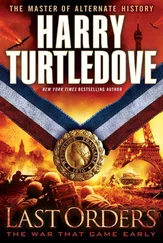It was for us, to put us back on our best behaviour, to clean up our acts. Seeing as how Amy aint here.
I'm undressing her in my heart.
It's just as well your thoughts don't show in your face, though that aint such a let-out with my mush. Face like a fire alarm. But you can't help your face, even less than your thoughts. You can't help flesh being flesh.
It's like lack used to say, I can see him holding forth now in the Coach, that there was more than one meat market at Smithfield once, bad old good old days. That night he was extra merry and Raysy wasn't, bad run with the nags I suppose. It was Vincey's birthday, Vincey's so-called birthday. And that new barmaid. You shouldn't think of a barmaid's bum. Raysy trying to make some joke about the Coach never going nowhere. Everyone tanked. And Jack saying, 'Cock Lane, Smithfield, famous for it once. You wonder how they think up the names. Cock Lane off Giltspur Street. We've all been there, aint we, Raysy? Cock lane, cock alley, cock passage, we've all driven the coach up there.'
So I said, Til just have to go myself.'
Trev looked up.
I said, 'That was Tony. Won't be in. Looks like he's down with the same bug as Dick. They're dropping like flies.'
Trev said, 'There's Roy. There's me.'
I said, 'It's out beyond Sutton. You've both got to be at the crem at three thirty. It's pushing it. Til have to go. Can you deal with the Harrises?'
Trev nodded. 'And if you're not back before I go to the crem?'
'You better put the Closed sign up. Late lunch. We can't ask Maggie here to hold the fort/ I was standing by the window, and I smiled. 'Unless you want to ask Jack Dodds to swap trades for half an hour. He's often said.'
And it was only then that I realized: the Fairfax Park Hospital and Home, Cheam. That was where June was. Where Amy went, where Jack didn't.
'It's all right, I'll go. Make a change for me.'
So a little after half past one I took the forms and the keys and went round to the lock-up and drove off in the black van with the blacked-out rear windows, what we called the Black Maria. The hearses were more friendly: Doris and Mavis. A ship is always she.
It wasn't as though I expected to see her. It wasn't as though it would look any different, because June was there, from all the other homes and hospitals that are an undertaker's regular port of call. Homes, Hospitals and Hospices, where people hexpire. And the worst are the Homes, since you know they aren't homes at all, it's just a sweet-sounding name for a clearing-station for the handicapped or the old, or a stand-in for that word you mustn't use any more: asylum. And you know that for lots of them it wasn't such a short stay, that this was where the deceased lived maybe most, maybe all of their life, and that life, in this case, meant a kind of death, a kind of not having a home to go to.
Like Bernie Skinner always says - like any landlord -after the third time of calling time, 'Aint none of you got homes to go to?' With that sudden fierceness, as if he's insulting his own customers, as if he really hates all boozers and loiterers and it's the worst disgrace you can throw at a person, to have no home to go to.
And they're always sad anyway, these pick-ups from long-term institutions. Taking them out of one box just to put them in another. As if there was never any choice in the first place, and if you'd listened carefully you could've heard the sound of a coffin being nailed, long before I showed up. I picked up a prisoner once. Wormwood Scrubs. Heart attack, fifty-one years. I said to the warder, 'What was he in for?' and he said, 'Murder. Murdered his missis three years ago. Turned out to be a life sentence after all.' Or a merciful release.
But the outcast and the outlawed have to die too, the shunned and forgotten, and somewhere there's a reluctant relative who has to step uneasily forward. And you never ask, it's not your place, what exactly this death means to them. Though you can see sometimes it's not the simple, neat thing they'd hoped for, a merciful release. Your job is to provide a decent funeral, decency and respect with regard to the final disposal, everyone deserves that. It's not your job to pry.
What you learn in this business is how to keep your mouth shut.
There were brick walls and a gateway and a drive and gardens and trees, so that though it was the edge of London you might have been arriving at someone's country mansion. Except the mansion had got mixed up with what looked like an old-style barracks block, with grilles on the windows, and, once through the main entrance, there was the usual sour-milk smell of Institution, the usual squeaky corridors leading off, the usual rattle of things being shifted by trolley.
The receptionist looked at my ID and the forms, and I thought, Some day someone will do this for June, someone will come with the papers. Release of the body. It'll be the next main event. The receptionist picked up her phone and tapped out a number, then looked at me, the way people do when they're on a phone as if they're not looking at you at all but at the same time they're staring. She had hair permed stiff as wire and glasses hanging from her neck on a chain, and I thought, She's been here long enough to view everyone as inferior, everyone as suspicious. Long enough to know that if you put her in charge she'd run it a whole lot better. Beaky face, twisty mouth. She held the receiver clamped to her ear, starting to look cross at being kept waiting and starting to look cross at me for seeing her being kept waiting, and I thought, as I do sometimes, it helps to calm things down, And you too, sweetheart, one day, you too. Release of the body.
Then she said crisply into the phone, 'I see. I'll tell him,'
then to me, with a sort of relish, 'You'll have to wait. The superintendent's on a late lunch, he won't be back till three.'
I said, 'I can wait,' thinking, I'm damn glad I didn't send Trev.
She scanned the forms again, as if they might have changed, then handed them back, looking at the next thing on her desk, like I was being dismissed. Then just at the point when she knew I was going to ask, she said with a little huff, as if I should know, 'Round the back of the main building and across the service yard.'
But I wouldVe known anyway. There's always an incinerator chimney. There's always a blank double door like the back exit of a cinema. If there's no one about and there's no other sign, you bang with your fist on the double door. Someone comes to a window and sees the Maria reversed up.
She said, 'Three o'clock.'
It's a sort of distaste. Stigma, that's the word. Like you don't want to know the man who takes away your rubbish. I'm used to it, it's natural. The old man used to say an undertaker's half lord, half leper. You shouldn't hold it against.
I thought of asking: Is there somewhere I could get a bite? Then reckoned better of it. Then I thought, for a mad moment: Twenty minutes - I could see June. Just see her. Out of plain curiosity, out of I don't know what. See what Jack never sees. I could find out and just go, a black jacket will take you most places. But then I thought, No, seeing June might not be so hard, might not be so bad, but first you had to get past this charmer.
I said, 'Three o'clock,' folding the forms back into my pocket.
But I looked towards where the corridors led off, thinking, So this is where. And this is where Amy comes twice a week, year in year out. I wonder if she says hello to this cow, I wonder if she gets a smile.
And it wasn't till then that I realized that today was Thursday. Thursday afternoons: it was one of Amy's afternoons. And I felt myself sort of bracing up, lifting my shoulders and tugging my lapel, the way you do when you might meet someone unplanned, the way an undertaker has to do most of the time. You never know who you might bump into, you never know whose toes you might tread on. It's not just a job, it's a place in the community. That's what the old man said. There's some who say I'm the next best thing to a vicar, and I say, "That's all right. Call me Vie.'
Читать дальше












